ACHIEVEMENTS
ANNOUNCEMENTS
APPOINTMENTS
ACHIEVEMENTS
UniSA Bachelor of Digital Business recognised as an ‘innovation that inspires’
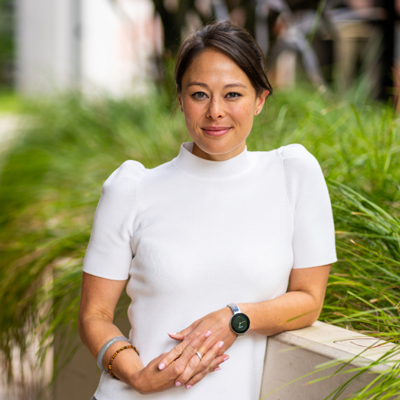 Program Director for the Bachelor of Digital Business Dr Sarah Chua. The Bachelor of Digital Business has been recognised by the AACSB as an Innovation that Inspires.
Program Director for the Bachelor of Digital Business Dr Sarah Chua. The Bachelor of Digital Business has been recognised by the AACSB as an Innovation that Inspires.UniSA has been recognised as one of 25 renowned institutions in the Innovations That Inspire spotlight program by AACSB International, the world’s largest business education alliance.
The annual initiative spotlights global institutions that demonstrate leadership in redefining business education, creating value for students, businesses and society.
This year, UniSA’s partnership with global professional services company Accenture to create an online Bachelor of Digital Business, providing high-level business and digital skills, has been recognised by the AACSB.
UniSA Provost and Chief Academic Officer Professor Joanne Cys says the University is “proud to have been recognised for our creative approach to providing an unparalleled learning experience with maximum impact”.
The Innovation Academy in Digital Business offers two custom programs – the Bachelor of Digital Business, and a course upskilling/reskilling established workforces in digital practices. The degree aims to help address known and emerging skills gaps and enhance productivity in Australia’s strategic growth areas.
AACSB CEO Caryn Beck-Dudly says new demands from stakeholders require reimagined business school initiatives.
“It is great to see UniSA is providing opportunities for students to develop their business knowledge through such an inventive program,” she says.
“By leveraging innovation, custom-built curricula, new modes of learning and increased educational access, the Innovative Academy gains a competitive advantage in an ever-evolving field.”
Seven high achieving UniSA students recognised with Playford Trust scholarships
Seven high achieving UniSA students have been awarded Playford Trust Scholarships, helping them to reach their potential and make the most of their studies.
The Playford Trust Scholarships support students working in areas of strategic importance to the state, including advanced manufacturing and new technologies; water energy and climate change; agriculture, aquaculture, and food production; space and defence technologies; mining and resource development; and health sciences and enabling technologies.
The UniSA recipients for 2023 were awarded across four scholarship categories:
Playford Trust / The Andy Thomas Space Foundation Scholarship
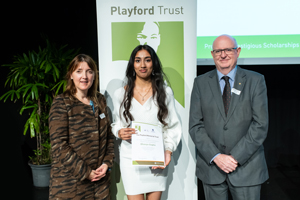
Bachelor of Information Technology student Bhavya Guptda aspires to work in the IT sector of the space industry but she’s not completely new to that world. During Year 11 at Plympton International College she was selected for the Space Industry Program at Lot Fourteen, where she worked with companies such as Myriota, Neumann Space and Inovor Technologies. Bhavya has also had exposure to high-level programming after completing a science internship with the British biodiversity and climate research organisation Operation Wallacea.
Playford Trust Honours Scholarship
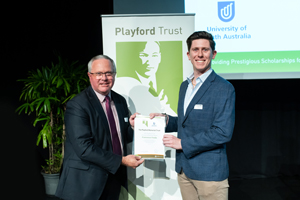
Bachelor of Construction Management (Honours) student Fransesco Freda’s research project is investigating the effects that Smart City attributes will have on the construction industry in the future, and how implementing Smart City elements such as Big Data, Internet of Things, and sustainability into building practices will influence citizens.
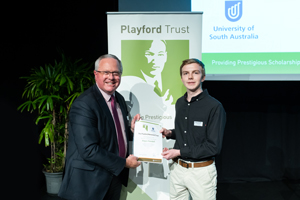
Bachelor of Engineering (Honours) (Electrical and Electronic) Angus Randell’s Honours project seeks to develop remote vehicle diagnostics for electric buses designed in Adelaide. This research aims to improve the efficiency and reliability of electric public transportation across Australia. In 2021 Angus became a member of the UniSA Motorsport Club, where he contributed to building a 500V Formula SAE race car. This experience, combined with his academic achievements, saw him offered an internship and then employment with the BusTech Group to help develop their electric buses.
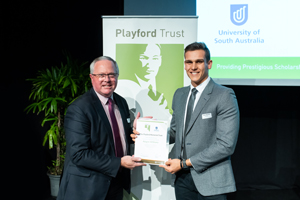
Bachelor of Engineering (Honours) (Mechanical and Advanced Manufacturing) student Keigan Williams’ goal is to help industry implement better design techniques that will increase production rates and reduce production costs, while providing quality goods that consumers demand. His Honours project involves the analysis and complex redesign of assembly, testing and commissioning facility of the Southcott AGC32E-Flex Crimper to meet customer demand increases with reduced risks.
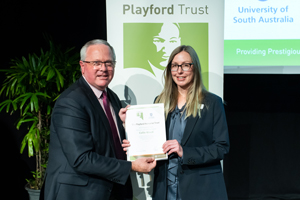
Bachelor of Applied Science (Honours) student Callie Wood’s Honours project involves monitoring the newly arrived lightbulb sea squirt (Clavelina lepadiformis), a known fouling organism likely to impact on aquaculture and biodiversity in South Australia. Callie completed the Bachelor of Outdoor and Environmental Leadership in two years rather than three, and even abseiled off the 70m high UniSA Bradley Building to raise awareness for her degree.
Playford Trust / Seeley International Scholarship
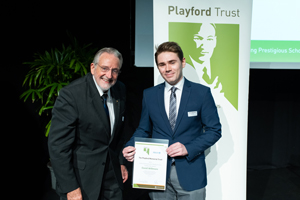
Doctor of Philosophy (Mechanical Engineering) student David Willmore wants to see hydrogen become a more viable renewable energy source, and to explore the complex fluid dynamics that can result from the interactions of hydrogen with the environment. The aim of his PhD is to improve the safety of Australia’s future hydrogen infrastructure.
Playford Trust / University of South Australia PhD Scholarship
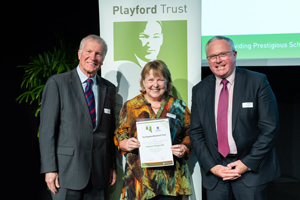
Doctor of Philosophy (Environmental Science and Remote Sensing) student Donna Fitzgerald is expanding on her Honours research into dieback in the red stringybark trees using remote sensing techniques. Cases of stringybark dieback are increasingly being observed in the Mount Lofty Ranges and this is causing a significant threat to forest ecosystems. Donna’s project will extend her investigation to cover the entire Adelaide Hills to determine the extent of the dieback, quantify the amount, and infer its likely causes.
UniSA professor honoured by SA Metropolitan Fire Service
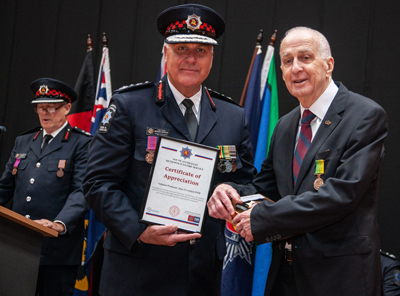
UniSA Adjunct Professor of Clinical Respiratory Physiology Alan Crockett has been recognised for his extensive contributions to improve the health and wellbeing of operational firefighters.
The South Australian Metropolitan Fire Service honoured Prof Crockett with a Certificate of Appreciation at their recruitment ceremony in May.
Prof Crockett has been involved with the MFS Medical Board since 2006 and recently published a notable 12-year longitudinal study on the lung function of urban firefighters to assess their health-related quality of life compared to those within the general population. His study was recently published in Respirology and was also focus of a special editorial in the same journal.
In addition to a 46-year career in Respiratory Medicine, Prof Crockett was the director of the Primary Care Respiratory Research Unit at the University of Adelaide.
In presenting the award, Metropolitan Fire Service CEO Michael Morgan said that Prof Crockett enhanced the learnings and operational practice of the SA MFS, enabling increased health outcomes for firefighters.
“I am extremely grateful for Professor Crockett’s commitment to this research and the benefits it has provided to not only our operational personnel, but to help improve the health of firefighters worldwide,” Morgan says in a post on LinkedIn.
Professor Jenny Fereday recognised for nursing and midwifery research
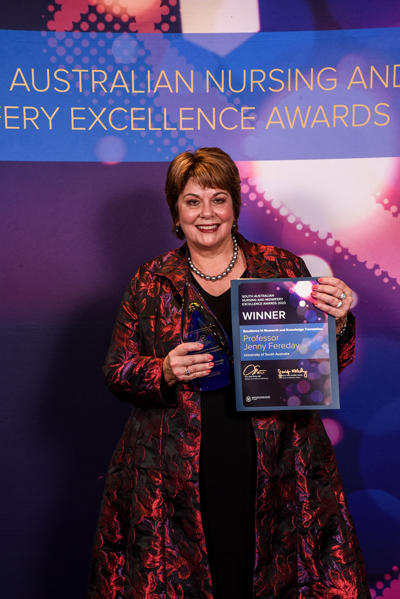
Clinical Professor of Midwifery at UniSA Jenny Fereday has been recognised for her significant contribution to nursing and midwifery research at this year’s SA Nursing and Midwifery Excellence Awards.
Professor Fereday won the Excellence in Research and Knowledge Translation Award for her contribution to research by prioritising evidence-informed practice through research, evaluation and quality improvement as well as creating a supportive culture for nurses and midwives to undertake research.
Prof Fereday was among a dozen winners at the awards ceremony, aimed at celebrating nurses and midwives across the state for their meaningful contributions to the health system.
She has undertaken collaborative research with nurses, midwives and medical officers to improve the uptake of immunisations, build self-compassion for nurses and midwives, and shaped models of care and clinical services in midwifery, paediatrics, and community nursing.
Prof Fereday also supervises UniSA Masters and PhD students.
Department for Health and Wellbeing chief executive Dr Robyn Lawrence says nurses and midwives are an integral part of the health system, providing the essential care and support people require through the different stages of their life.
“All the finalists and winners should be proud of their achievements – they make a significant difference in the lives of patients every day,” she says.
Prof Fereday was appointed to the role of Clinical Professor of Midwifery at UniSA in 2022.
She was previously executive director of nursing and midwifery at the Women’s and Children’s Health Network and was a member of the Channel 7 Children’s Research Foundation and Research Committee and an ambassador for Healthy Development Adelaide.
Research to support refugee students recognised as most outstanding thesis
A UniSA PhD candidate’s work to identify the best ways to support students from refugee backgrounds to resettle in Australia, has been recognised as the University’s most outstanding research thesis.
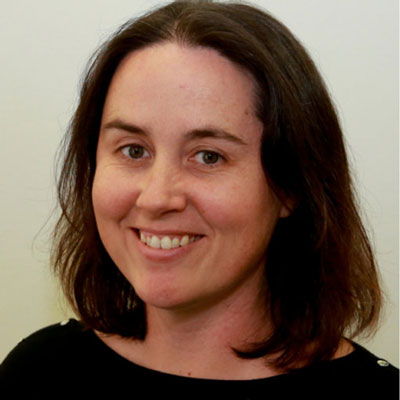
Dr Emily Miller’s PhD research investigated the experiences of South Australian high school students from refugee backgrounds. Close to half of UNHCR-recognised refugees or asylum seekers are under the age of 18 years. Dr Miller’s research addressed a gap in studies about best practice support for high school students in resettlement. Her research has positively impacted communities and individuals at the local level and has influenced state, federal, and international policymaking.
Dr Miller has been awarded the Ian Davey Research Thesis Prize, which was established by UniSA to acknowledge the most outstanding research thesis by a UniSA Higher Degree by Research student leading to a Doctor of Philosophy degree. The prize is worth $5000.
In choosing her PhD topic, Dr Miller was motivated to contribute to positive outcomes for people from refugee backgrounds.
“As a resettlement country, Australia has an obligation to support positive settlement outcomes, including through inclusive and responsive educational practice,” she says.
Dr Miller’s research found that both school practices and broader socio-ecological factors impacted students’ aspirations, experiences and identities.
“When I found out about receiving the Ian Davey prize, I was really humbled and grateful,” Dr Miller says.
She expressed gratitude to the selection committee, to Emeritus Professor Ian Davey for initiating the award, and to her supervisor, Professor Tahereh Ziaian, “for her leadership in this field and for sharing her expertise with me throughout the PhD”.
Dr Miller’s methodology enabled her to engage meaningfully with participants’ communities as well as the service providers that work with these communities. She acknowledged the chance to collaborate with industry experts at Multicultural Youth South Australia (MYSA) and the Australian Migrant Resource Centre (AMRC):
“I learned so much working with these organisations and through connections to communities,” she says.
Dr Miller continues to work in her chosen field. She is currently engaged in several research projects, including “a large international project investigating settlement of young people and families from refugee and migrant backgrounds”. She recently addressed the United Nations Committee on Migration.
She says she’s excited to consider how winning the Ian Davey prize “might help to further promote the research and raise the profile of young people, families and communities from refugee backgrounds in Australia”.
Dr Miller was a PhD student in UniSA Justice and Society. Her PhD was conferred in December 2022.
PhD student Lainie Anderson named SA’s Emerging Historian
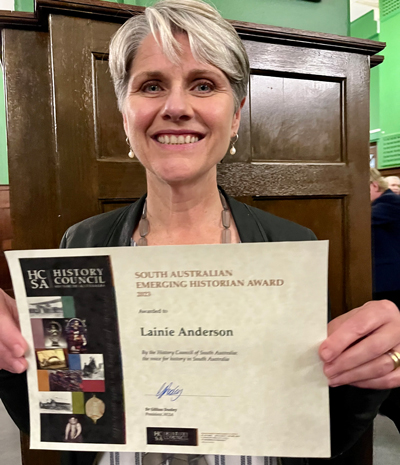
UniSA PhD student Lainie Anderson has been named the 2023 SA Emerging Historian by the History Council of South Australia.
The award was primarily in recognition of her work to raise awareness of the historic biplane, the Vickers Vimy, at Adelaide Airport.
The Vimy is a specially modified Great War-era bomber and is one of the oldest civil aircraft in the world.
A new display honouring the aircraft was unveiled at the airport in 2022.
Anderson was also awarded the Emerging Historian Award for her work as part of her PhD project on the life of police trailblazer Kate Cocks.
In 1915, Kate Cocks became the first policewoman in the British Empire employed on the same salary as men, and with the same powers of arrest.
Anderson’s creative practice research project explores how a work of popular fiction – a murder mystery – can do justice to a significant and complex character in history.
“I’m hoping my project will bring Kate Cocks and World War I Adelaide back to life, while also shining a light on the changing role and status of women in early 20th century South Australia,” she says.
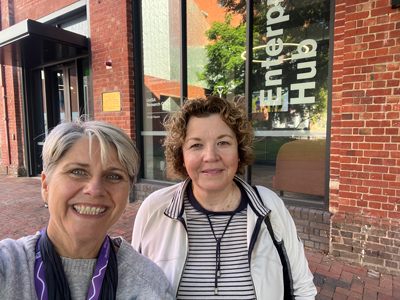 Lainie with UniSA alumnus Jodie Wardle on the History Festival tour of the Enterprise Hub.
Lainie with UniSA alumnus Jodie Wardle on the History Festival tour of the Enterprise Hub.Anderson, who is an Adelaide journalist and author, has also explored the historic haunt in the north-western corner of Adelaide’s Light Square, UniSA’s new Enterprise Hub.
She led a tour of the site’s rich history, which includes the days of the Le Rox nightclub and Night Train Theatre restaurant, as part of South Australia’s History Festival.
The building, which has been bestowed the Kaurna name, Yangadlitya Kumangka, aims to connect SA businesses with researchers and academics to solve complex challenges and grow the state.
Anderson was the winner of the UniSA Three Minute Thesis event last year.
MOD. highly commended at National Museum Awards
MOD. at UniSA has been highly commended at the Australian Museum and Galleries Association National Conference.
MOD. Exhibition and Experience Design Manager Dr Lisa Bailey says the recognition highlights their success in exhibition design for the current exhibition Flex, and the success of the Ethos Community of Practice, which is a forum for people to practice ethical questioning and contribute to societal change within and around the University.
MOD. was recognised in the following Australian Museums and Galleries National Awards (MAGNA) categories:
Highly Commended: Temporary or Travelling Exhibition for Flex – the 2023 exhibition which tests how we might inch closer, or rush towards, boundaries. In Flex, visitors can explore interactive galleries where they can meet digital versions of themselves, delve into body augmentation, learn about resilience, explore about living on Mars and challenge their perception of pain.
Highly Commended: Community Engagement and Outreach for Ethos, a place for having conversations about future-focused ethical issues relating to research, technological development, and the broader social context. Each forum focuses on an object as the starting point.
For information on MAGNA and the judges’ comments on each category winner, visit to the awards web page.
King’s Birthday Honours for UniSA staff and governing body member
A number of UniSA staff and a University Council member are among those recognised in this year’s King’s Birthday Honours List.
Those receiving honours included UniSA Council member Jim Whalley, UniSA Dean of External Engagement Professor Anthony Elliott, Professor of Business Law Jennifer McKay and clinical educator Suzanne Caragianis.
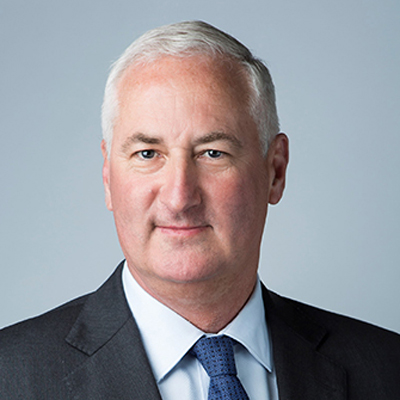
UniSA Council member Jim Whalley was made an Officer (AO) In the General Division for distinguished service to business, particularly the defence capability industry, to the public sector, to aviation history, and to the community.
Whalley is deputy chair, executive director and co-founder of Nova Group. He is a former air force fighter pilot and test pilot and a graduate of the Royal Air Force Empire Test Pilots’ School. He’s the patron of the South Australian Aviation Museum.
Whalley said he felt very privileged and very honoured to be recognised.
“It reflects the efforts of a whole lot of other people, not just me, and a lot of the support I’ve been given by family, friends and those close to me,’’ he told The Advertiser.
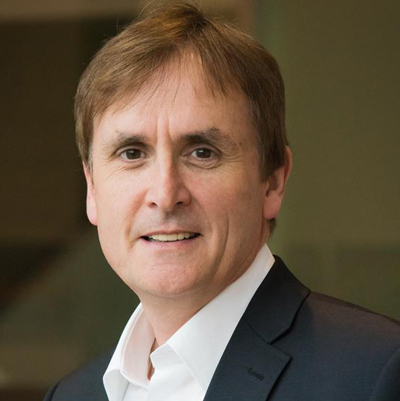
Prof Anthony Elliott, who’s also director of the Jean Monnet Centre of Excellence & Network at UniSA, was made a Member (AM) in the General Division for significant service to education, and to social science policy and research.
“To be included in this year’s King’s Birthday Honours List is exhilarating,” Prof Elliott says. “It’s truly a great honour to be recognised.
“I have been exceptionally privileged to be given opportunities where I could make a difference – and make a difference where it counts – through interdisciplinary scholarship, mentoring and global engagement.”
In a career spanning more than three decades, Prof Elliott’s work has been integral to improving understanding of identity and the self, globalisation, technology and social change and – most recently – the digital revolution.
Prof Elliott is a Fellow of the Academy of Social Sciences in the UK, Fellow of the Academy of Social Sciences in Australia, Fellow of the Cambridge Commonwealth Trust, and a Senior Member of King’s College, Cambridge. He currently serves as a member of the Australian Research Council’s College of Experts. In 2023, he was appointed Bradley Distinguished Professor at UniSA in recognition for his research leadership and international scholarly impact.
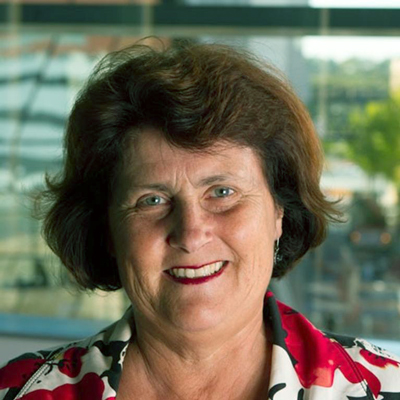
Prof Jennifer McKay was made a Member (AM) in the General Division for significant service to the law, and to the legal profession.
Prof McKay says the recognition was a reminder of the importance of “adding value to the community via significant research and service to the law and the legal profession”.
“It is also a reminder of the dignity of the defence of truth, justice and sustainability and the joy of education,” she said on LinkedIn. “Always add value is my motto and a long-term perspective is required.”
Prof McKay has conducted research and taught at Melbourne, Adelaide and James Cook universities and has adjunct appointments at ANU (College of Law). She convenes the Australian Law Research awards for the Council of Australian Law Deans. She worked as a legal practitioner and held, for more than 25 years, a part time appointment as a Commissioner of the Environment Resources and Development Court in SA. She was a Fulbright senior scholar in 2008 at UC Berkeley School of Law, and in 2019 was invited to give a Tedx talk Duty to Cooperate: Making Messy Mosaic Laws into Jigsaw Laws. Prof McKay has edited several books and written more than 160 journal articles on the concept of ecologically sustainable development.
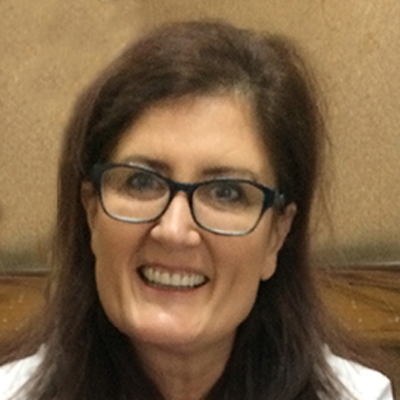
Clinical educator Suzanne Caragianis was awarded a Medal (OAM) in the General Division for service to occupational therapy. Caragianis is also the director of Coastal Hand Therapy and the founder of the charity Helping Hands in Bhutan. You can read more about her story in UniSA Connect.
A full list of the University’s alumni community who were acknowledged in the King’s Birthday Honours will be published on the UniSA Alumni network pages in coming days.
Dr Jack Desbiolles named winner of the 2023 David Roget Award for Excellence
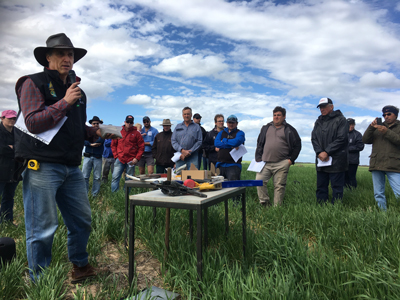 Jack Desbiolles discussing inclusion ripping with a group of local farmers and advisors at a recent MSF field day.
Jack Desbiolles discussing inclusion ripping with a group of local farmers and advisors at a recent MSF field day.A passion for conservation agriculture, an innovative mind, and a dedication to helping farmers in the Mallee region are behind the work of Agricultural Research Engineer, UniSA’s Dr Jack Desbiolles.
Now, this work has been recognised by Mallee Sustainable Farming, which has awarded him the prestigious 2023 David Roget Award for Excellence.
Nominated by colleagues and peers in the farming community, the award acknowledges Dr Desbiolles’ broad and ongoing contribution to improving environmental, economic and social sustainability of dryland farming production systems both across the Mallee and further afield.
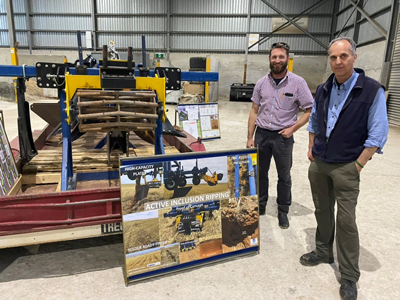 Jack Desbiolles and Chris Saunders with the deep ripping display trailer at a recent field event.
Jack Desbiolles and Chris Saunders with the deep ripping display trailer at a recent field event.It recognises Dr Desbiolles’ long-standing sustainable soil amelioration practices, including no-till soil practices, a deep-slotting point with back-swept shallow wings, bent leg openers, the high work rate plough, and more recently, the use of strip amelioration to reduce erosion risk and seed priming for improved dry seeding outcomes.
A firm believer in bringing communities together to achieve a common goal, Dr Desbiolles and his team at UniSA’s unique Agricultural Machinery Research and Design Centre (AMRDC), have pioneered many innovations that have improved the livelihoods of farmers in some of the most hostile and challenging environments in the world.
Dr Desbiolles’ drive to solving real farmer engineering issues and to communicate these in a farmer-friendly way has been key to the uptake of his innovations. He is always available to talk with farmers and it is this approach that will continue to propel a sustainable and efficient farming sector in the future.
ANNOUNCEMENTS
Could smart watches and wearable devices protect our military?

Could smart watches and wearable devices give our military the edge when it comes to protecting defence personnel against biological and chemical warfare threats?
Their ability to continuously measure vital signs is being taken a step further in a world-first project being led by UniSA in conjunction with the Department of Defence, industry partner Insight Via Artificial Intelligence and the University of Adelaide.
The project involves developing statistical machine learning algorithms to detect early signs of infection in a person, using data from consumer wearable devices.
Lead researcher UniSA Professor Siobhan Banks says the goal is to develop data pipelines and use ground breaking algorithms to monitor the health of military personnel, instigating early treatment for infections where necessary and ensuring people working in the armed forces are fit for duty.
“Most diagnostic methods involve sampling blood or nasal fluid to detect pathogens responsible for infections,” Professor Banks says. “This approach is costly, time consuming and requires a laboratory for analysis.
“Consumer wearable devices continuously measure vital signs, including heart rate, skin temperature and sleep, creating huge sets of data for each person. Changes in these parameters occur very quickly after infection as part of the immune response.”
For many viruses, infections only become apparent once symptoms occur, but the data from wearable devices could flag physiological and behavioural changes much quicker.
The researchers say that off-the-shelf consumer wearables contain sophisticated sensors that could be easily deployed to collect thousands of hours of data continuously, at low cost and low burden.
“What if we could make use of this passively recorded data to detect the earliest molecular and cellular physiological events, caused by pathogen exposure, even prior to active infection?”
The project will develop a cloud service that links to wearable devices and a smart phone application, recognising irregular sensor readings so that people can be clustered based on their health profiles.
Chief Defence Scientist Professor Tanya Monro AC says the UniSA-led project could potentially enhance defence capability in warfare, including early detection of chemical or biological threats.
The project is contributing to the Department of Defence’s “Operating in Chemical, Biological, Radiological and Nuclear Environments” STaR Shot (OCE STaR Shot). Under its Human Integrated Sensor System program, the OCE STaR Shot is developing and demonstrating the concepts and technologies that can turn the human body into a sensor for CBRN threats, including infectious disease.
This research is supported by the Commonwealth of Australia as represented by the Defence Science and Technology Group of the Department of Defence and the Defence Artificial Intelligence Research Network (DAIRNet).
UniSA is number one in Australia for graduate employability
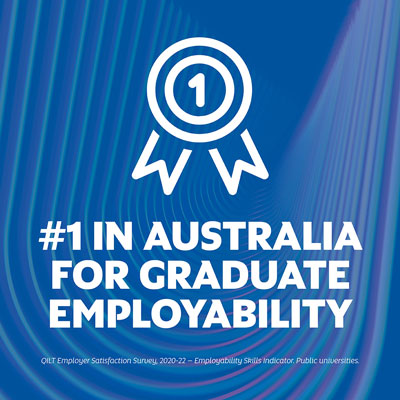
Employers have ranked UniSA graduates number one in Australia for employability, up from number two last year, further demonstrating how the University is helping students launch unstoppable careers.
The 2022 QILT Employer Satisfaction Survey (ESS) measures employers’ views on the attributes of recent graduates from Australian higher education institutions.
UniSA scored the highest rating when asked about the employability of graduates, with a 91% satisfaction rate in the 2022 Employer Satisfaction Survey, released in April 2023.
UniSA Vice Chancellor Professor David Lloyd described the results as a fantastic achievement, which provides students with reassurance they are gaining practical skills and will graduate career ready.
“In the survey, employability skills are defined as the ability to perform and innovate in the workplace,” he says.
“We know that our focus on innovation and enterprise is helping our students become future leaders, change-makers and ready to ask big questions in the world.”
The 2022 ESS represents the largest survey of its kind, reporting the views of 3452 employers.
More information on UniSA’s other rankings achievements is available in the about section of the UniSA website.
2023 Images of Research and Teaching winners announced as People’s Choice voting opens
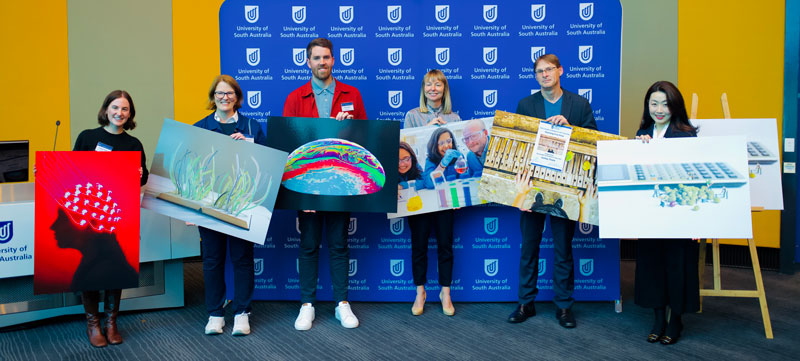
From tiny fat particles used to safely deliver drugs to the body to an image encapsulating the value of imagination for young students; the winners of UniSA’s annual Images of Research and Teaching competition have been unveiled.
The Images of Research and Teaching competition celebrates the breadth and diversity of the University’s innovation, and the people who make it happen.
Images and videos were submitted by staff and students across two categories: research and teaching.
The 2023 winners, announced in early June, were:
Research Category:
- First prize ($5000): Dr Paul Joyce – Beyond the Horizon of a Nano-World (Clinical and Health Sciences – staff)
- Second prize ($2000): Kate Shierlaw – Knowledge Sprouts (Creative – student)
- Third prize ($1000): Sophie Jano – Shining a Light on Cognition (Justice and Society – student)
Teaching Category:
- First prize ($5000): Ashley Thiele – Imagination: the Loudest Instrument in the Room (Education Futures – student)
- Second prize ($2000): Dr Mei Lim – Next Gen Bean Counters (Business – staff)
- Third prize ($1000): Nikita Parekh – Adding a Pop of Colour to Science Teaching (Clinical and Health Sciences – student)
UniSA Deputy Vice Chancellor: Research and Enterprise Professor Marnie Hughes-Warrington AO says all academic units were represented in the 17 finalists.
“The outstanding images and videos submitted across both categories showcase the quality of our teaching, learning and research,” Prof Hughes-Warrington says. “Warm congratulations to Paul, Kate, Sophie, Ashley, Mei, Nikita, and all the 2023 finalists.”
UniSA Provost and Chief Academic Officer Professor Joanne Cys says 11 of the 17 finalists were students.
“This competition serves as a testament to our commitment to excellence and innovation,” Prof Cys says. “We are pleased to see how it raises the University’s profile and demonstrates the wide impact of our work to the public, our community and partners.”
The 2023 Images of Research and Teaching People’s Choice competition has officially opened.
To view the finalists and vote, visit the Images of Research and Teaching website. Voting closes Friday 7 July.
The winner of the People’s Choice competition will be announced online on Monday, 14 August.
University of Enterprise on mission to expand biotech partnerships
UniSA took its enterprising expertise to Boston, USA, earlier this month, as part of South Australia’s delegation to the BIO International Convention (BIO).
UniSA is the only university participating in the 16-organisation delegation led by the South Australian Government.
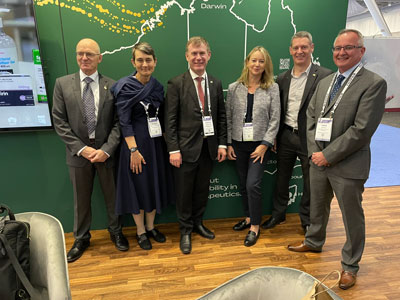
UniSA Deputy Vice Chancellor Research and Enterprise Professor Marnie Hughes-Warrington AO says BIO provided a unique opportunity to showcase the University’s expertise in biomaterials engineering, pharmaceutical innovation and research commercialisation to a global audience.
“As South Australia’s University of Enterprise, UniSA has an excellent track record in connecting industry with researchers and knowledge experts, and commercialising scientific research,” Prof Hughes-Warrington says.
“We have many state-of-the-art research laboratories and exceptional facilities for collaborating with industry. These include our Enterprise Hub, which provides a fantastic virtual and physical space.”
The BIO event aims to promote the critical role of biotechnology and pharmaceutical science on a global stage and foster new partnerships to broker innovations with life-changing impact.
UniSA’s delegation shared its own capabilities in these disciplines and those that complement them – from cancer research, therapeutics, clinical trials and personalised medicine to advanced manufacturing and artificial intelligence. This includes cutting-edge research in diverse areas such as using Australian Indigenous native plant extracts to reduce anti-inflammatory activity, and reducing antimicrobial resistance in humans, animals and plants.
UniSA has commercialised more than 130 research innovations, including technology licencing deals and the creation of spin-out companies. These include spin-out companies Cincera, which aims to treat inflammatory and fibrotic conditions by blocking key enzymatic targets, reducing inflammatory impacts on peripheral tissues in the process, and Ferronova, which is developing a new cancer device to accurately identify sentinel lymph nodes for management of solid tumours.
UniSA’s Enterprise Hub works with organisations across 13 industry sectors to help them reach their commercial goals, drawing on its researchers, industry partnerships, and the experts in UniSA’s commercialisation arm.
APPOINTMENTS
New Executive Dean to continue success in STEM
UniSA STEM’s incoming Executive Dean is looking forward to working alongside colleagues to provide society with the knowledge, skills, and capacity to meet local and global challenges of the future.
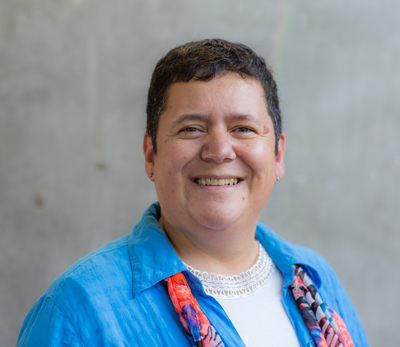
Professor Jacqui Ramagge will begin the role on 31 July following Professor Julie Mills’ longstanding service as well as Professor Peter Murphy who has been interim executive dean since January.
Professor Ramagge, a mathematician of international standing, comes from Durham University in the UK where she served as the Executive Dean of the Faculty of Science, responsible for 7000 students and 1000 staff and representing about one third of the University’s academic profile.
“I’m excited to be contributing to an environment that enables high-quality and impactful research, while also working with colleagues to provide an educational experience that transforms the lives of our students” she says.
“Broadly speaking, I am keen to ensure we continue to provide a high-quality and accessible education that prepares graduates for a future that is changing so quickly that it may look quite different when they graduate from when they joined us.
“I’m hoping to nurture a culture that values our combined contributions and creates an environment in which we can all thrive.”
Before her role at Durham, Professor Ramagge served as the Head of School of Mathematics and Statistics at the University of Sydney, and as Head of School of Mathematics and Applied Statistics at the University of Wollongong.
Provost and Chief Academic Officer Professor Joanne Cys says Prof Ramagge’s strong values in diversity, equity and inclusion align well with UniSA’s own vision and values of equity in access and participation.
“I hope you will join me in providing a warm welcome and sincere congratulations to Prof Ramagge on her appointment as Executive Dean: UniSA STEM from 31 July,” she says.
“In the meantime, we thank and acknowledge the leadership of Professor Peter Murphy, Interim Executive Dean: UniSA STEM, who has undertaken this role from January 2023, as well as the significant contributions made by Professor Julie Mills before him.
“We also acknowledge the teamwork and leadership of the UniSA STEM Executive Team more broadly.”
Australian Centre for Child Protection leaders to help transform SA’s child protection system
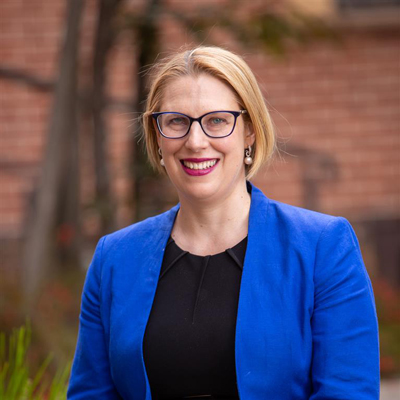
The Australian Centre for Child Protection at UniSA will play a key role in developing and driving a long-term vision to transform South Australia’s child protection system.
Director of the Australian Centre for Child Protection (ACCP) Professor Leah Bromfield will lead a new expert group tasked with improving outcomes for South Australian children and young people.
The South Australian Child Protection Expert Group will comprise government and non-government members from across Australia who have recognised expertise in child protection research, policy and practice. It’s been established by the South Australian Government to fulfil the first recommendation of Kate Alexander’s independent review of the State’s child protection system.
Prof Bromfield will chair the group while ACCP deputy director Associate Professor Melissa O’Donnell has been appointed as an expert member. UniSA adjuncts Professor Fiona Ward and Professor Sharon Dawe are also members of the group.
The expert group has been tasked with:
- Improving child protection response models and quality of practice
- Developing and implementing a 20-year vision for transforming child protection
- Enhancing therapeutic responses and targeted interventions
- Improving out of home care support for young people
- Convening a child protection summit
Professor Bromfield says the expert advisory group will develop a vision for transforming, rather than just reforming, child protection.
“Our child protection system was not designed to respond to the scale of demand that it’s currently facing, as one in three South Australian children are now reported before they turn 18,” Prof Bromfield says.
“Rather than asking how we can reform our current systems, the group has been granted the opportunity to start with a blank page and to ask, ‘What system would we design for protecting children?’
“In asking the question differently, South Australia has an opportunity to once more be a leader in child protection and determine what’s working well and what we should let go of into the future.”
Child Protection Minister Katrine Hildyard says the Government is determined to drive reform that helps to make a lasting, positive difference in the lives of children and young people.
“This group, chaired by a national leader in this field, Professor Leah Bromfield, will bring together independent, professional expertise – supported by robust data and evidence – to challenge orthodoxy and examine new ideas to contend with the increasingly complex challenges facing our State’s child protection system,” she says.
Whyalla set to ‘shake off the shackles’ and embrace a bright future
A research project aimed at revitalising Whyalla and capitalising on the proposed multibillion-dollar hydrogen and renewable energy investment has been launched by the city’s local council in collaboration with UniSA.
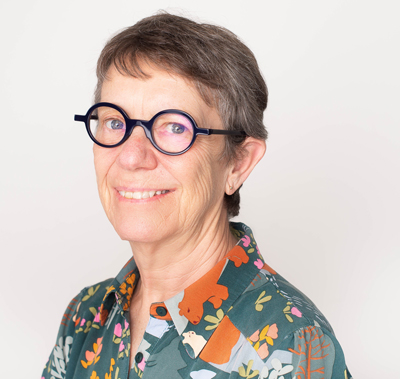
City of Whyalla Corporate Services director Kathy Jarrett will devote one day a week over the next six months identifying how the city can embrace a positive future.
Jarrett has been appointed UniSA’s inaugural Industry Fellow, a new research position created by the University to help SA’s regional cities thrive.
In Whyalla’s case, the mission is “to think constructively about the past, gain optimism and hope for the future and, as a result, gain greater happiness in the present”.
Whyalla has plenty of reasons to be optimistic following the recent announcement by the SA Government to build a $593 million green hydrogen hub near the city.
City of Whyalla CEO Justin Commons says this significant investment in renewable energy will generate a more prosperous future for Whyalla.
“It promises to catalyse an industrial renaissance not seen since the birth of the steelworks, resulting in the creation of thousands of jobs across multiple renewable energy and decarbonisation projects,” Commons says.
“The scale of change that Whyalla is about to experience cannot be approached using a ‘business as usual’ attitude. We require talented people, better housing, and more amenities. This will only happen if Whyalla aims high to leverage the once in a lifetime opportunity before it.”
Commons says the city needs to be welcoming, inclusive and forward looking, with a clear plan for growth and development.
UniSA will fund a part-time project officer to work with Jarrett over the next six months and map out ideas to achieve these goals.
UniSA Deputy Vice Chancellor: Research and Enterprise Professor Marnie Hughes-Warrington AO says the project could potentially be expanded and continued beyond six months.
“Key stakeholders from Whyalla’s community – including businesspeople, service providers, community leaders and community groups – will be engaged in this project,” Prof Warrington-Hughes says.
“A series of workshops will also be held, feeding back data to develop a framework and tools that could be implemented to help Whyalla fulfil its potential.
“At the end of the day, we want to co-create initiatives with Whyalla City Council that address any barriers to optimism, growth and development, and at the same time improve residents’ mental wellbeing and resilience.”
Whyalla Mayor Phill Stone says the project will focus on how the community sees itself; how it’s viewed by those outside Whyalla; and how the city can collectively “shift its identity”.
Read the full story in the media release.
UniSA represented on SA Museum board
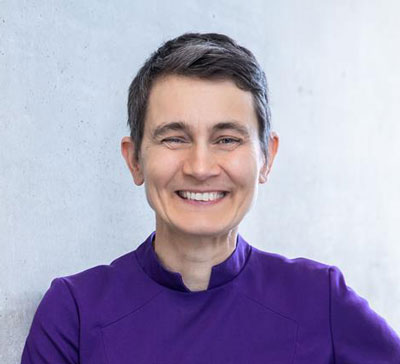
UniSA Deputy Vice Chancellor: Research and Enterprise Professor Marnie Hughes-Warrington AO has joined the South Australia’s Museum’s Foundation Board.
Prof Hughes-Warrington is one of three new members to the South Australian Museum Board including UniSA Adjunct Professor Chris Daniels.
The board is led by chair Kim Cheater, who says the new members’ passion, expertise and insights will be major assets to the museum.
“These important appointments have greatly enriched the board and ensure that the organisation will have the requisite skills and knowledge to guide the museum into the future,” he says.
“In particular, this adds significant expertise around scientific research and education, which are core to the purpose of the museum.”
Profs Hughes-Warrington and Daniels join five other highly-regarded board members with a diverse range of business, arts, scientific, education, technological and government expertise.
